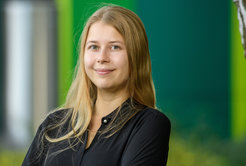Sara Hetzel receives Marthe-Vogt-Prize
Bioinformatician awarded for her doctoral thesis on DNA methylation
Congratulations to Sara Hetzel from the Meissner lab, who has been awarded the Marthe Vogt Prize 2024 for her work on the epigenetic landscape of cancer. The prize is named after the German neuroscientist Marthe Vogt, who has pioneered research on neurotransmitters. It is awarded by the Forschungsverbund Berlin e.V., an association of Leibniz research institutes in Berlin. This year, two scientists are honored for their excellent PhD thesis.

Epigenetic marks change the way our genes work without altering the DNA sequence. One important and reversible epigenetic modification, DNA methylation, occurs primarily on cytosines, one of the four bases that make up our genetic code. By chemically marking DNA with a methyl group, it essentially locks genes in an "off position" and is an important layer of gene control. Information about the methylation state of DNA can be derived from sequencing data, but these data are difficult to process. "We have developed a bioinformatics tool that makes it possible to more efficiently analyze the level of methylation heterogeneity in cancer cells using sequencing data," explains Sara Hetzel. The methylation states of most cancers are fundamentally different from those of healthy cells and are usually globally lower combined with abnormal gain at certain genes. Sara characterized the methylation landscape of acute lymphoblastic leukemia and found that it is very highly methylated, unlike many other cancers, and identified proteins that might play a role in this dynamic.
Cancer cell lines are often used as model systems because they are easy to grow in the lab. In a separate line of work, Sara used bioinformatics tools to analyze these cell lines and their epigenetic differences from cancer cells in the human body. "Essentially, we found two main DNA methylation patterns that emerge in these cell lines and were able to show that the methylation state of the cultured cells is highly correlated with the original cancer type." These findings show that there might be distinct forms of genome regulation at work in cancer cell cultures, which could potentially affect experiments performed with these models. "Overall, I really enjoyed not only analyzing the data myself, but also developing tools and making them public, so that they can be used by other scientists to further study epigenetic phenomena in cancer," she says. This is especially important because the exact role of DNA methylation in cancer is still poorly understood. "Studying cancers with exceptional methylomes, as we did, could help to fully unravel how these non-canonical DNA methylation landscapes arise and if or how they provide function within a tumor”, says Sara.
Sara Hetzel grew up in Berlin and studied Bioinformatics at the Freie Universität. She went to Australia during her Master’s where she worked in the group of Denis Bauer to develop a tool that predicts variant-aware off-targets for CRISPR/Cas9. She then joined the lab of Alexander Meissner at the MPIMG in 2018. Sara graduated summa cum lauda in 2023 and will continue her research as a Postdoc at the Hasso-Plattner-Institute (Potsdam, Germany) starting in January 2025.
About the Marthe Vogt Prize
The Marthe Vogt Prize honors an outstanding doctoral thesis in a research area covered by one of the institutes of the Forschungsverbund Berlin. It is named after Marthe Vogt (1903-2003), a neurotransmitter researcher who worked at the Kaiser Wilhelm Institute for Brain Research in Berlin-Buch, the current site of the Leibniz Institute for Molecular Pharmacology (FMP). Due to the Nazi regime’s policies against Jewish Scientists, she left Germany in 1935 and continued her research in Great Britain. The second recipient this year is Alexandra Quitmann from the Weierstrass Institute in Berlin.












